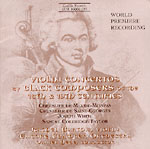This enterprising disc brings to light the violin concertos of four neglected or forgotten composers of African descent. Joseph Boulogne, a.k.a. the Chevalier de Saint-Georges, the son of a slave-woman, became one of the most highly regarded and well known social and artistic figures in 19th century France, enjoying multiple careers as musician, sportsman, and military leader. His A major Violin Concerto (1775) looks both backward to Vivaldi and forward to Mozart (some believe Mozart’s concertos were influenced by Saint-Georges). This charming work exhibits a high-spirited drive in the outer movements, with much keen invention in the solo writing, and serene calm in the central Largo–this last, one of Saint-Georges’ exquisitely beautiful slow movements.
Not much is known about the life of the other Chevalier on this disc, the French-born J.J.O. de Meude-Monpas. Besides being a musketeer for Louis XVI, he did leave two books on music and six violin concertos. His D major concerto (1786) has little of the virtuoso flair of Saint-Georges, but covers a broader range of emotions (being more firmly entrenched in the classical era) with an opening allegro that builds nicely upon its wonderfully engaging themes. Joseph White, born in Cuba, studied at the Paris Conservatoire, and later began an international performing and composing career, winning glowing praise from the likes of Rossini. Written after Paganini’s expansion of the violin’s technical possibilities, White’s Concerto in F-sharp minor (1864) easily is the most virtuosic of this collection, abounding in wide leaps, double-stops, and other impressive feats. The first movement’s main theme evokes the heated romanticism of Felix Mendelssohn or Robert Schumann, but the challenging solo writing puts it in league with the works of Henryk Wieniawski (though White has better tunes).
British-born Samuel Coleridge-Taylor, known primarily for his cantata Hiawatha’s Wedding Feast, is the most recognizable composer of the group. His 1899 Romance in G, bearing none of the traces of the ethnic harmonies and rhythms employed in his Africa Suite (on a previously reviewed Cedille release), sounds strictly European by contrast. Nonetheless it remains a deeply felt composition of considerable harmonic and melodic sophistication. The mood here is similar to the slow movement of Brahms’ Violin Concerto, but with a central animato section providing a welcome change of pace. Soloist Rachel Barton sounds perfectly at home in all four of these stylistically disparate compositions, but she gives an especially impressive performance of White’s expressively and technically demanding concerto. The composers would be pleased to hear such committed advocacy on the part of Daniel Hege and the Encore Chamber Orchestra, who present these works as repertoire staples. Cedille’s usual top-drawer sound makes this a disc you should not miss. [11/14/2001]
































